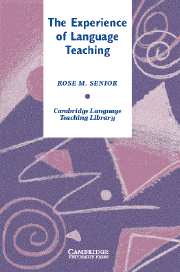Book contents
- Frontmatter
- Contents
- List of figures
- Acknowledgements
- Preface
- Introduction
- 1 Establishing a framework for the book
- 2 Training to be a language teacher
- 3 Becoming a committed language teacher
- 4 Establishing the learning environment
- 5 The diversity of the language classroom
- 6 Managing individuals
- 7 Teaching flexibly
- 8 Vitalising the language class
- 9 Maintaining the classroom community
- 10 Frustrations and rewards
- 11 What drives language teachers
- 12 Towards a teacher-generated theory of classroom practice
- References
- Index
11 - What drives language teachers
Published online by Cambridge University Press: 05 November 2012
- Frontmatter
- Contents
- List of figures
- Acknowledgements
- Preface
- Introduction
- 1 Establishing a framework for the book
- 2 Training to be a language teacher
- 3 Becoming a committed language teacher
- 4 Establishing the learning environment
- 5 The diversity of the language classroom
- 6 Managing individuals
- 7 Teaching flexibly
- 8 Vitalising the language class
- 9 Maintaining the classroom community
- 10 Frustrations and rewards
- 11 What drives language teachers
- 12 Towards a teacher-generated theory of classroom practice
- References
- Index
Summary
The previous chapter described the range of contexts in which language teachers in English-speaking countries typically work. It focused on both the frustrations and the rewards of language teaching – showing how the frustrations of being a language teacher often relate to factors beyond the teacher's control, while the rewards are personal ones that result from interacting with responsive students and teaching in personally satisfying ways. The chapter demonstrated that for language teachers the intrinsic rewards of teaching far outweigh extrinsic rewards such as status or money. It showed that frustration and dissatisfaction occur when opportunities to reap the intrinsic rewards of teaching are reduced.
The present chapter outlines the key assumptions, beliefs and values of experienced language teachers. Section 11.1 points out why it is necessary to tread cautiously when seeking to investigate the assumptions and beliefs of language teachers – and the motivational forces that appear to drive their classroom actions. Section 11.2 outlines the assumptions and beliefs about language learning that underpin communicative language teaching as it is implemented in western educational contexts. It also describes how language teachers teach pragmatic versions of CLT that are in line with their preferred practices and personal assumptions about classroom language learning. Section 11.3 describes the values shared by language teachers, showing that their classroom behaviour is driven by a desire to keep their classes functioning as unified groups and maintain rapport with individuals.
Information
- Type
- Chapter
- Information
- The Experience of Language Teaching , pp. 246 - 269Publisher: Cambridge University PressPrint publication year: 2006
